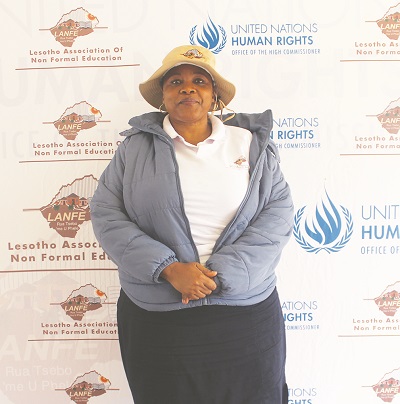By Mpho Shelile
MASERU – One of the major concerns of developing countries is struggling to create conditions necessary for the sustainable development of their respective societies, they are faced with minimum levels of education and skills training for the majority of the citizens and this is where The Lesotho association of non-formal education (NFE) comes in. NFE hopes to promote education on a global level, as it is a fundamental right of every individual. A day has been marked worldwide to acknowledge making quality education accessible to everyone regardless of gender, socio-economic status, and age.
So in celebration of the international literacy day, NFE held a press conference at LANFE hall on the 8th September, to brief the media about their exclusion in the budget of 2023, Mrs. Lisemelo Mosakeng who is the spokesperson of NFE stated that they took initiative to help those who couldn’t get educated through formal schooling to also get education informally however funding is a problem as the government does not disburse the funds allocated to them so they are left to fend for themselves.
“We only get allocated 0.02% from the budget in the previous years which is already insufficient, , which can only pay NFE staffs but is not enough to cover other expenses however in this current year we were not included at all ”, stated Mrs. Mosakeng. She added that they still lack things such as coordination of service providers, qualification framework, research and development as well as monitoring and evaluation. “If we had all the above mentioned I am certain we could provide quality education to all our learner”.
“The extensive efforts undertaken by many nations during the past two decades to provide adequate educational opportunities have not met with sufficient success, either qualitatively or quantitatively. A substantial portion of the population in most countries still lacks access to schooling, and the few who actually attain relatively high levels of education often find it difficult to encounter sufficient employment. In an attempt to extend educational opportunities, particularly for the poor in urban and rural areas, many countries have begun to emphasize the development and expansion of non-formal education (NFE). Through NFE, nations aspire to providing at least minimum levels of basic education, skills training, plus complementary programs for human development: early childhood education, health and nutrition as well as environmental education, so why can’t we be like other nations?”, probed Mosakeng.
Non-formal education is usually viewed not only as a means to complement and supplement formal education, but also as a way to extend and further national, social and economic development goals. In general, as countries began to promote the development of no formal education, they concentrated upon building large extension programs or initiating local level efforts. Relatively few took a more holistic view including the development of national policy-planning for NFE. The Kingdom of Lesotho represents an outstanding exception in this regard. Furthermore, Lesotho has made a major effort to assist many local level programs with in-service training, educational materials and evaluation programs, making it a leading country in Africa in the field of non-formal education.
A necessary pre-requisite to full policy-planning in NFE is the careful study of the complex phenomena it encompasses. Non-formal education, though deeply rooted in the traditions of Lesotho, previously had not been the subject of systematic and comprehensive study and activities designed to provide Basotho youth and adults with knowledge and skills which are required for individuals to function effectively, efficiently and productively in the various sectors of life.
For this reason the Ministry of Education in combination with other ministries, decided to launch a major national survey of non-formal education conducted by the Lesotho Distance Teaching Center (LDTC). “The basic purpose of the study was to provide essential information and analyses regarding NFE particularly for the consideration of national policy-planners, and also for others involved in conducting NFE activities. Support for the study was provided by the United States Agency for International Development (USAID), as a part of its extensive assistance for the structuring of NFE resources in Lesotho. The study was carried out by the LDTC over a two-year period from 1980 to 1982. World Education provided logistical support for the authors during the final phase of analysis and report preparation in 1983”, proclaimed Mosakeng.
She concluded that even though non-formal education is important and must be practiced to all those who are not fortunate enough to get the formal one, “our imploration as the NFE is for the government to at least give us the funds needed so we could continue giving more education across Lesotho, for I do not think we are anywhere near the saying “leave no one behind” and promote literacy for a world in transition” said Mosakeng.


